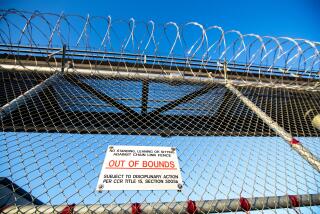Muslim prisoner wins Supreme Court case to keep his beard
- Share via
Reporting from Washington — The Supreme Court ruled unanimously for a Muslim prisoner Tuesday, deciding he has a religious-freedom right to grow a half-inch beard.
The justices said prison authorities in Arkansas had no convincing reason for contending that Gregory Holt’s neatly trimmed beard would represent a danger.
It is “almost preposterous to think that you could hide” a dangerous weapon in such a beard, a magistrate commented when the case was first heard.
The Arkansas prison system’s no-beard policy was unusual. The “vast majority” of states and federal prisons permit inmates to grow 1/2-inch beards for religious or other reasons, said Justice Samuel A. Alito Jr.
The religious-liberties case of Holt vs. Hobbs drew attention mostly because it followed last year’s contentious dispute involving the Hobby Lobby stores and their refusal to provide a full range of contraceptives to their female employees.
In a 5-4 decision written by Alito, the court ruled that this requirement, part of the Obama administration’s healthcare law, violated the religious-liberty rights of Hobby Lobby’s corporate owners. As evangelical Christians, they objected to paying for certain contraceptives that they said caused early abortions.
In both cases, the court applied laws passed by Congress that require federal agencies and state prisons to defer, when possible, to a person’s sincerely held religious beliefs.
In Tuesday’s opinion, Alito said Holt, who is also known as Abdul Maalik Muhammad, had a sincerely held belief that he must grow a beard. And he said Arkansas prison authorities had not shown that enforcing their no-beard policy was necessary for safety or security. Holt is serving a life term in a maximum security facility for a brutal assault on an ex-girlfriend.
Justices Ruth Bader Ginsburg and Sonia Sotomayor concurred in the decision, although they dissented last year in the Hobby Lobby case. This case is different, Ginsburg wrote, because “accommodating [Holt’s] religious belief would not detrimentally affect others who do not share [his] belief.”
Eric Rassbach, a lawyer for the Becket Fund, which represented the inmate, called the ruling “a win for all Americans who value religious liberty. Where government can accommodate religion, it ought to.”
The ruling applies to both federal and military prisons, Rassbach said, but some installations could claim they have special security concerns.
On Twitter: @DavidGSavage
More to Read
Sign up for Essential California
The most important California stories and recommendations in your inbox every morning.
You may occasionally receive promotional content from the Los Angeles Times.














